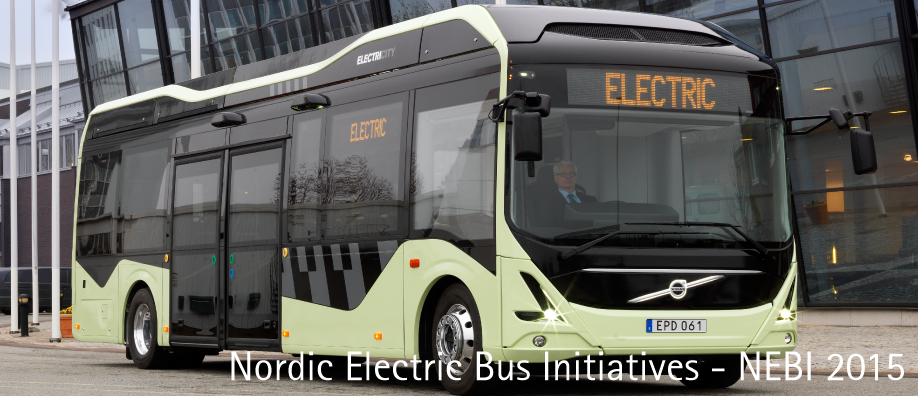
Nordic Electric Bus Initiatives – NEBI 2015
Nordic Energy Research, under the umbrella of the Nordic Energy Transport Platform together with Forum for Transport Innovation held a seminar on Nordic Electric Bus Initiatives at Lindholmen Science Park…
Nordic Energy Research, under the umbrella of the Nordic Energy Transport Platform together with Forum for Transport Innovation held a seminar on Nordic Electric Bus Initiatives at Lindholmen Science Park, Gothenburg, Sweden on September 1-2, 2015.
The purpose of the seminar was to bring together representatives from public transport authorities, traffic operators, manufacturers, private stakeholders and the academia for an informative best-practice sharing event on Nordic electric bus initiatives.
The aim of the event was:
- Share best practices from cases where electric buses have been deployed.
- Share general knowledge regarding the potential of electrification of buses in public transport.
- Share expectations and address common issues/hurdles on how public transport authorities can navigate the technology shift.
- Connect and build networks between Nordic representatives and stakeholders
100 attendees from public transport authorities, municipalities, public transport operators, vehicle producers, energy companies and academia participated.
The attendees could listen to 18 presentations showcasing several projects and planned expansion for and introduction of electrical buses in the Nordic countries. All presentations were recorded on video and presentations in pdf format. They can be accessed below.
The workshop had a lively debate on technical options related to types of charging infrastructure, on-board capacity of batteries, capital expenses vs. operation expenses, purchasing and tenders for electric buses. It became evident that many of these initiatives were not aware of each other and struggled with the same challenges in planning, technical options, tenders and negotiations with bus manufacturers and operators.
It was also evident that innovation and also serial production of electrical buses had taken place over the last 2 years and the drop in battery cost offers public transport authorities an opportunity to revisit Electric buses and Plug-in hybrid busses as a viable option for the future.
Outcome:
Participants expressed a strong interest in systematic Nordic knowledge sharing and securing standardisation of tenders and –whenever possible – joint procurement of electric buses and related infrastructure. The workshop organisers will explore how to meet these interests.
Programme
Introductory remarks, Svend Søyland presentation(pdf) and video
Showcases
- Copenhagen trial with 12m B.Y.D. K9 electrical buses, Victor Hug, Movia presentation(pdf) and video
- E-mobility project T.eBuS – International electric bus test platform in Finland Sami Ojamo presentation(pdf) and video part 1 and part 2
- Stavanger E-bus project, Rolf Michael Odland, Boreal presentation(pdf) and video
Ongoing and Planned projects
- Electric buses in residential areas, Robert Aronsson presentation(pdf) and video
- ZeEUS Electric Hybrids demonstrated in Stockholm, Maria Övergaard presentation(pdf) and video
- Electric bus sustainability, cost and customer performance in southwest Sweden – Sven Borén presentation(pdf) and video
- Need more capacity – Solution Electric Bus- Robert Sahlberg presentation(pdf) and video
- Ongoing tender for opportunity charged e-busses – Mikkel Krogsgaard Niss presentation(pdf) and video
- Helsinki region electric bus activities with pre-commercial pilot “ePELI” – Reijo Mäkinen presentation(pdf) and video
- City buses – A Swedish Bus Study – Magnus Lindgren presentation(pdf) and video
How to enable Nordic Cooperation?
Moderated by: Svend Søyland (NER) and Magnus Henke (Trafikverket, Sweden)
Site-visit: ElectriCity indoor bus stop
Day 2
Experiences with Charging Infrastructure
- Challenges and barriers and our role in the electrification of bus public transport, Susanna Hurtig, Project Manager, Vattenfall, Sweden presentation(pdf) and video
- VTT Finland experiences, Samu Kukkonen, Research Scientist, VTT Technical Research Centre of Finland presentation(pdf) and video
- Electric Hybrid vs Full Electric, Jessica Sandström, Senior Vice President City Mobility, Volvo Bus Corporation, Sweden presentation(pdf) and video
- Method to analyse cost effectiveness of different charging systems for electric buses – Anders Grauers presentation(pdf) and video part 1 and part 2
Planning and Strategy
- Renewable energy in public transport in Oslo and Akershus – Pernille Aga presentation(pdf) and video part 1 and part 2
- Migration to electric bus operation in Stockholm County – Maria Övergaard presentation(pdf)
Policy frameworks and Business models
- Quiet city buses – benefits and possibilities to gain quiet buses in procurements – Michael Koucky presentation(pdf) and video
- New policy measures in Sweden – Magnus Lindgren presentation(pdf) and video
Wrap-up – conclusions
Summary of group discussions and closing
